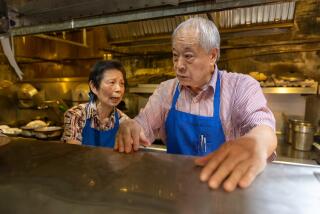For Generations of Chinese, It Was a One-Sided Love Affair
- Share via
When I was growing up in Greenville, Miss., my grandfather, Frank Chu Lin, constantly reminded me to speak Chinese. “Grandson, if you don’t know the language, you could be in a lot of trouble,” he said. “One day you may have to move to China to live and work.”
I wondered why a man who loved this nation so much that he named the family grocery store Four Power Market, in honor of the Allied forces, kept repeating that warning. Many years passed before I learned that the United States had not rolled out the welcome mat to him. In 1882, Congress passed the Chinese Exclusion Act, which barred my grandfather and tens of thousands of Chinese from becoming naturalized U.S. citizens and kept others out altogether. Its preamble says, “The coming of Chinese laborers to this country endangers the good order of certain localities.” A poster of that era depicted a Chinese man eating a rat, with the slogan, “They must go.”
The law, which was amended or modified every 10 years, later included Asians from other nations. On Dec. 17, 1943, at President Roosevelt’s urging, Congress partly repealed the law but still limited the number of Chinese who could immigrate to this country to 105 a year. It wasn’t until 1965 that this nation finally put immigration from both Asia and Europe on an equal footing.
Growing up in New Orleans during World War II, I had a less ambivalent view of the U.S. than my grandfather. I was proud of my dad because he worked for Higgins Industries and helped to design and to build the landing craft that delivered Allied troops on the beaches at Normandy on D-day and the Pacific islands. I remember wearing a child’s military uniform and holding Dad’s hand as we toured the battleships and carriers moored on Battleship Row.
Near the end of that war, Dad was required to report to his local draft board. An official couldn’t believe that my father was not a U.S. citizen. “You came to this country when you were 5 years old,” he said. “Why aren’t you a citizen?”
“If you check the law you’ll find out Chinese cannot become U.S. citizens,” Dad told him. After checking, the flustered official acknowledged that Dad was right. After the law was partly repealed, my brother Paul and I proudly witnessed our parents and grandparents sworn in as citizens.
It’s astounding how few Americans -- even in high places -- know about this ugly chapter in our history. I asked Sen. John McCain (R-Ariz.) recently if he would support an effort to win posthumous U.S. citizenship for Chinese and other Asian Americans who fought in the Civil War.
“Anyone who has served this country with valor should be recognized,” McCain said. Then he asked why it had taken so long to apply for citizenship for these veterans. When I told him about the exclusion laws, the senator seemed stunned.
I told him one of his constituents, Sharon O’Connor of Tucson, was the great-granddaughter of one of those Civil War veterans. Edward Day Cohota, also known as Sing Loo of Shanghai, China, was in the Civil War. He served a total of 30 years and tried unsuccessfully until his death in 1935 to become a U.S. citizen.
The legacy of the exclusion laws continues to this day. The Chinatowns that survive are products of those discriminatory laws. The racial climate back then also spawned laws to prevent Chinese from owning property or testifying in court.
The Chinese have contributed much to this country, but the laws prevented them from doing more. Many of the history textbooks have little or no information about the challenges these people faced or tell of their accomplishments.
The Chinese American Museum of Los Angeles, which opens today, will help illuminate some of this history and illustrate how Chinese Americans helped to build a better nation. I’m confident that if Grandfather Chu Lin were alive today he would say, “Much more needs to be done, but America has changed for the better. I’m happy that I brought my family here.”
More to Read
Sign up for Essential California
The most important California stories and recommendations in your inbox every morning.
You may occasionally receive promotional content from the Los Angeles Times.













